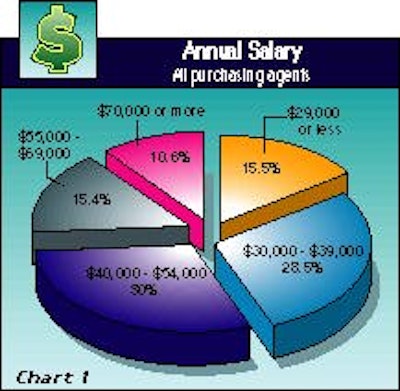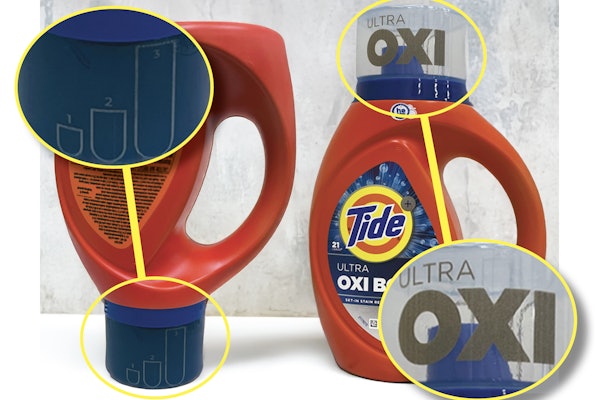
Like almost everyone on the packaging team, purchasing agents are working harder than ever, trying to maintain their footing on the shifting sands of moving deadlines and shrinking resources. So say purchasing people who responded to Packaging World's recent salary and job satisfaction survey.
Compared to packaging engineers and managers in the survey (see PW, Sept. '97, p. 52 and p. 60), purchasing department workers were compensated at the lowest levels, and complained the most. For details on how the survey was conducted, see sidebar, opposite page.
Just under half of purchasing agent respondents (44%) earn $39ꯠ or less (Chart 1). In contrast, a mere 10% of respondents identifying themselves as packaging engineers earned $39ꯠ or less.
Like the other job titles PW surveyed, the earnings of women respondents tended to be near the lower end of the salary spectrum compared to men. Almost 65% of women purchasing agents earned $39ꯠ or less, versus 30% for men (Chart 2).
Much of this salary gap among respondents can be attributed to differences in experience. About 45% of women purchasing agents have five years of experience or less. That number for their male counterparts was just under 23%. At the other end of the spectrum, over 36% of men had over 15 years of experience, versus just 12% for women.
Differences in education levels were less pronounced: about 52% of women respondents in purchasing report a college degree, versus 58% for men. And almost 29% of women cited a high school degree as their highest level of education completed, versus 25% for men.
The real question is, why are women respondents less experienced and less educated than their male counterparts? Unfortunately, the numbers did not reveal any empirical evidence of why this might be.
What's interesting is that among the survey respondents, far more women are working in purchasing than in engineering or management. Indeed, almost 42% of purchasing agent respondents were women (Chart 3). On the other hand, women represent just 20% of managers (identified as managers of all departments, including purchasing) and women make up just 7% of packaging engineers and 6% of plant managers and VPs.
Salaries in purchasing tended to be higher among respondents in the Northeast and on the West Coast, where more than 60% of respondents earned $40ꯠ or more. Purchasing agents in the Southeast earned the least: 45% earned $40ꯠ or more. Among respondents in the Midwest, about 57% cleared $40ꯠ.
Education and experience count
While over half of purchasing agent respondents had a college degree (Chart 4), more than one in four reported a high school degree as their highest level of education. That's a bigger percentage than any other job title surveyed. Of purchasing agents with high school degrees, about 70% earned $39ꯠ or less; that figure was only 41% for purchasing agents with college degrees. Interestingly, 5.6% of purchasing agent respondents reported post-graduate degrees, and all of them earned over $39ꯠ.
Experience, too, made a measurable difference in salary among purchasing agents. Over 40% of purchasing agents have been in the field for more than 10 years (Chart 5). Of those, 75% earned over $39ꯠ. Among those respondents with 10 or fewer years of experience, only about 40% earned over $39ꯠ.
Purchasing agent respondents also tended to be older than respondents in other job titles. A full half are 40 to 54 years old, with another 13% reporting ages of 55 or more years. Only 4% of purchasing agent respondents are under 30.
The size of the company at which purchasing agents work made a significant difference in salaries reported by respondents, more so than other job titles. About 40% of purchasing agents in the survey work at companies employing fewer than 250 people altogether. Of them, almost 58% earned $39ꯠ or less. Of those who work at medium-sized firms employing 250 to 1ꯠ employees, that number of lower-wage earners drops to 42%. And at large firms employing over 1ꯠ people, 66% of purchasing agents earn more than $39ꯠ.
At the same time, purchasing agents also reported the smallest pay raises of all job titles surveyed. Almost a third of respondents reported an increase of less than 3% (Chart 6). In fact, about 80% reported increases of less than 5%.
Satisfaction low, too
So how do purchasing agents feel about their jobs? Answer: not too good. Under a quarter say they are satisfied with their salary and advancement potential (Chart 7). As expected, fewer women purchasing agents were satisfied than men in these areas. Only about 20% of women respondents were satisfied with their salaries vs 26% of men. And only about 15% of women were satisfied with advancement potential, compared to 28% for men.
On the bright side, just over half of all respondents are satisfied with their decision-making autonomy, clearly the highest-ranked job criterion among purchasing respondents. Curiously, despite the poor showings in salary and advancement, almost half of purchasing agent respondents gave a thumbs up when evaluating their overall job satisfaction.
To get respondents talking about what concerns them most, the survey asked respondents to cite the areas they'd like to spend more time on at work, as well as what prevents them from doing so.
All respondents-not just purchasing-reported that ongoing crisis management was the number-one time-zapper. "Putting out fires and endless meetings take up most of my valuable time," comments a purchasing agent at a large Northeast food company.
Many purchasing agents told PW they feel they are spending too much time performing the perhaps mundane processing and expediting of purchase orders. "Expediting components reduces the amount of time to source and focus on important circumstances that arise," observes a purchasing agent at a medium-sized manufacturing firm in the Midwest.
Other respondents, especially at smaller companies, report having to perform non-purchasing or even clerical duties. "I would like to spend more time on actual purchasing. But since we are a smaller company I have other duties that take time away," says a purchasing agent at a food company in North Carolina. Another purchasing agent at a small pharmaceutical company in California says, "Being the only one in purchasing does not give me enough time to find more suppliers for materials."
Downsizing exacerbates the problem for those who survive the cuts: "We have gone through a downsizing and more of my time is spent on day-to-day activities," laments a purchasing manager at a small Southwest food company.
Indeed, almost three-quarters of purchasing agent respondents said they have added more responsibilities without more pay in the last year (Chart 8). That's compared to just over half of packaging engineers and department managers, and just under half of plant managers and VPs.
Improving cost/value
What would purchasing agents do if they had more time? Save money. Almost universally, purchasing agents across company and industry lines said that they don't have enough time to perform thorough cost analyses. A purchasing agent at an animal feed packer in the Midwest would like to pursue "combination orders for better pricing and inventory control." As a purchasing agent for 13 locations, she would also like to focus on "combination freight efficiencies."
A purchasing manager at a large food company in the Northwest says, "Putting out fires prevents me from developing total cost analyses, just-in-time [inventory management] and other projects." A supply chain manager at a large pharmaceutical company in the Northeast says he'd like to "do more analyses of money spent at various vendors, look for reductions and cost improvements."
Need more sourcing
Many purchasing agents said that they simply lack the time to perform the bread-and-butter work of sourcing new suppliers-especially those that might provide better or more suitable packaging materials. "The lack of resources prevents me from following up on sourcing opportunities," says a purchasing agent at a large Midwestern chemical company.
"Researching the best materials and applications for our process" is what one purchasing agent at a large food company in the Southeast would do if she had more time. "I spend too much time expediting and putting out fires to be able to focus on new ideas."
A purchasing agent at a large food company in the Mid-Atlantic region wants to develop "more integrated supply networks." He adds that "lack of staffing in the technical services department inhibits packaging material testing" to evaluate potential alternatives.
A purchasing agent at a medium-sized manufacturer in the Northeast says some of her goals are to "look at the big picture instead of fighting fires, work on strategic partnering with key suppliers, and work to improve processes instead of working within confines of existing processes and software."
Getting along with others
Some purchasing agents complained about obtaining cooperation from employees in other departments. "Lack of authority to keep plants from implementing changes" irritates a purchasing agent based in the Northeast at a large chemical company. A colleague at a medium-sized California food company finds it difficult to "get production to evaluate alternate items."
At a Northeastern dairy, a respondent says the time crunch prevents her from "training plant employees to do counting and receiving correctly." She adds, "[There's] barely enough time to get my job done. [There's] no help and no one knows how to do my job."
And like survey respondents in other job titles, the daily grind often prevents purchasing agents from ostensibly performing more valuable services for the company.
A purchasing employee for a medium-sized Southwestern food company says "heavy day-to-day responsibilities" prevent him from "putting together better projections" of anticipated ordering volumes of packaging materials.
Another in the Midwest says, "Dealing with day-to-day purchases of less than $100 prevents me from consolidating suppliers as quickly as I'd like." This comment came from a purchasing agent at a large pharmaceutical company.
A few purchasing respondents wanted more time to computerize their operations. One at a large food company in the Southeast complained about the lack of progress in "automating our system. Still behind schedule on computerized system."
Similarly, a purchasing manager at a medium-sized Midwestern food company says he would like to spend more time on "implementing new systems such as EDI [electronic data interchange]-very hard to allocate time and resources away from everyday activities."
Vendor visits
Many purchasing agents would also like to get to know their existing vendors better. One who works in a Midwestern facility for a large manufacturing firm says she would like to "gain more knowledge of raw materials used by my suppliers."
Others wanted to get out more and visit with vendors. And still others feel the need to see how the machinery and materials they buy actually work on the manufacturing floor. A purchasing agent at a large manufacturing firm in the Northeast says she wants something as simple as the opportunity to "actually see how [our] plants operate."
While not all purchasing respondents expressed dissatisfaction with their jobs-indeed, some 45% said they were satisfied overall-an evaluation of the survey results revealed that purchasing agents tended to be more disgruntled than packaging engineers, department managers, plant managers and VPs. It could be that more than a few purchasing agents would like more time to do what one respondent commented: "Look for a new job."

























